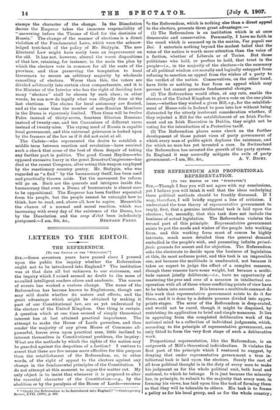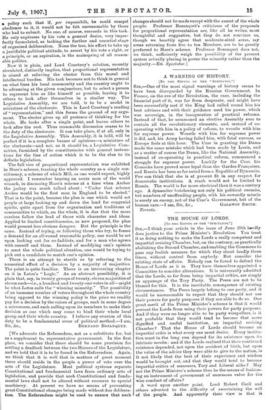THE REFERENDUM AND PROPORTIONAL REPRESENTATION.
LTO THE EDITOR OP THE "SPECTATOR."]
SIR,—Though I fear you will not agree with my conclusions, yet I believe you will think it well that the ideas underlying these political methods should be frankly discussed. If I may, therefore, I will briefly suggest a line of criticism. I understand the true theory of representative government to imply, first, that a genuine intellectual task is laid upon the electors ; but, secondly, that this task does not include the business of actual legislation. The Referendum -violates the second part of this principle. Representative government exists to put the needs and wishes of the people into working form, and this working form must of course be highly intricate, much more detailed than the general demand embodied in the people's wish, and presenting infinite prinicl- facie grounds for assent and for objection. The Referendum asks the electorate to decide upon the business of legislation at this, its most arduous point, and this task is an impossible one, not because the multitude is uneducated, not because it takes an expert to judge the effect of a complex measure, though these reasons have some weight, but because a multi- tude cannot jointly deliberate,—i.e., have no opportunity of mastering the pros and cons of a measure in intellectual co- operation with all of those whose conflicting points of view have to be taken into account. It is because a multitude cannnot do thie work that representative government exists to do it for them, and it is done by a definite process divided into appro- priate stages. The error of the Referendum is deep-seated, and would not be cured, though it might be disguised, by restricting its application to brief and simple measures. It lies in appealing from the completed deliberative work of the national mind to a collection of individual judgments, which, according to the principle of representative government, are only fitted to form the very first stage of such a deliberative work.
Proportional representation, like the Referendum, is an outgrowth of Mills theoretical individualism. It violates the first part of the principle which I ventured to suggest, by denying that under representative government a true in- tellectual task is laid upon the electors. Surely the root of all true political thought is in the duty of every man to make his judgment as for the whole political unit, both local and national, to which he belongs. It is just because the minority has, in principle, to submit to the majority that every man, in forming his views, has laid upon him th3 task of forming them so that they will be tolerable to others. His task is to frame a policy as for his local group, and as for the whole country; s policy such that if, per intpossibile, he could compel obedience to it, it would not be felt unreasonable by those who had to submit. No one, of course, succeeds in this task. He only expfesses by his vote a general desire, very imper- fectly formulated, as lacking the further and essential stage of organised deliberation. None the less, his effort to take up a justifiable political attitude, to assert by his vote a right, or a principle, or an aspiration, is the mainspring of all reason- able politics.
Now it is plain, and Lord Courtney's solution, recently circulated, distinctly implies, that proportional representation is aimed at relieving the elector from this moral and intellectual burden. His task becomes not to think in general on what lines his local community and the country ought to be advancing at the given conjuncture, but to select a person to represent him as like himself as possible, leaving it to others to look after themselves in a similar way. The Legislative Assembly, we are told, is to be a model in miniature of the electorate. This is Lord Courtney's reading of "representation," and this forms the ground of my argu- ment. The elector gives up all pretence of thinking for the -whole. He looks after a single point, and leaves others to look after the rest. Thus reasonable discussion ceases to be the duty of the electorate. It can take place, if at all, only in the Legislative Assembly. This Assembly, it is held, will be perfect if it is a complete bazaar of opinions—a miniature of the electorate—and not, as it should be, a Legislative Com- mittee, furnished by the constituencies with general instruc- tions for the line of action which is to be the clue to its definite legislation.
The full vice of proportional representation was exhibited in Hare's scheme, treating the whole country as a single con- stituency, a scheme of which Mill, as one would expect, highly approved. I remember hearing an acute man of the world remark, in discussing Hare's scheme at a time when Archer the jockey was much talked about : "Under that scheme Archer would be the first man in England to be elected." That is to the point, because the plan is one which would set people at large looking up and down the land for congenial spirits, quite apart from the organisation and traditions of communities to which, on the whole, it is due that the more careless follow the lead of those with character and ideas. Applied to limited constituencies, as now proposed, the plan would present less obvious dangers. But the principle is the same. Instead of trying, or following those who try, to frame a demand for an all-round reasonable policy, one would be set upon looking out for co-faddists, and for a man who agrees with oneself and them. Instead of modifying one's opinion to meet the whole political situation, one would be trying to pick out a candidate to match one's opinion.
There is an attempt to startle us by referring to the numerical effect of a decision by a majority of majorities. The point is quite familiar. There is an interesting chapter on it in Lotze's "Logic." As an abstract possibility, it is plain that, say, in twenty groups of twenty, eleven majorities of eleven each—i.e., a hundred and twenty-one votes in all—might be what Lotze calls the "winning minority." The possibility of an immense number of voters throughout the whole country being opposed to the winning policy is the price we readily pay for a decision by the voices of groups, each in some degree a microcosm, and each calling upon its members to make their decision as one which may come to bind their whole local group and their whole country. I believe any evasion of this duty to be a fundamental error of political method.—I am,
[We advocate the Referendum, not as a substitute for, but as a supplement to, representative government, In the first place, we consider that there should be some provision for settling a deadlock between the two Houses of the Legislature, and we hold that it is to be found in the Referendum. Again, we think that it is well that in matters of great moment there should reside in the people a power of veto over the acts of the Legislature. Most political systems separate Constitutional and fundamental laws from ordinary acts of legislation, and provide that such Constitutional and funda- mental laws shall not be altered without recourse to special machinery. At present we have no means of preventing great Constitutional changes being made without due delibera- tion. The Referendum might be used to ensure that such changes should not be made except with the assent of the whole people. Professor Bosanquet's criticisms of the proposals for proportional representation are, like all he writes, most thoughtful and suggestive, but they do not convince us, though we heartily agree that moderate-sized areas, say areas returning from five to ten Members, are to be greatly preferred to Hare's scheme. Professor Bosanquet does not, we think, sufficiently weigh the possibility of the present system actually placing in power the minority rather than the majority.—ED. Spectator.'















































 Previous page
Previous page